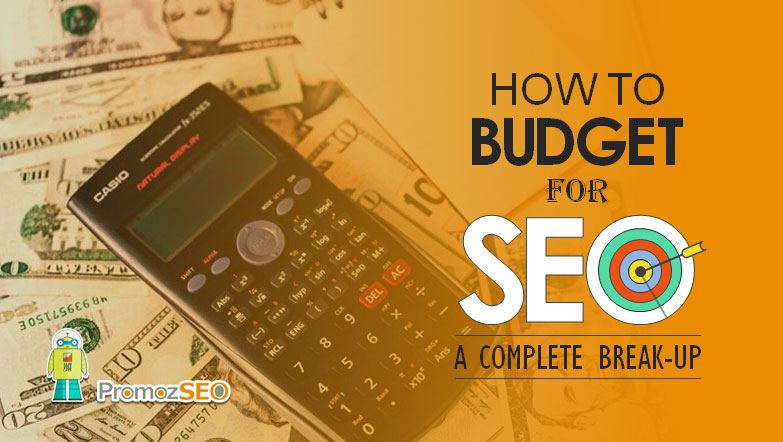How to Budget for SEO – A Complete Break-Up of How to Spend Money in SEO

Being logically economic can work as a great stepping stone to a successful business. Utilizing your resources to their maximum potency can not only make your end-results better but also saves a lot of your hard-earned cash. This is why companies must learn how to budget for SEO and acquire the best possible results without breaking the bank.
Deciding to go for SEO and starting off without a concrete strategy is similar to try catching a bullet with your teeth – in both cases, the consequences can be ghastly. But with some planning, you can utilize your money smartly in SEO and draw the maximum amount of benefits from your investments.
How?
Well, that’s exactly what you are going to find out in this blog post!
Here, I will be telling you how you can segregate your funding in every category of your SEO campaigns without laying it to waste too much. Needless to say, this will vary depending on your requirements and end-goals.
However, that being said, a comprehensive estimation of your SEO budget is what you need in the first place to make it work regardless of your objectives and targets.
So, without any further ado, let’s find that out, how to budget for your SEO campaigns!
Things You Need to Consider Before Planning the Budget for SEO
Time is money! We all know that. But the reason behind repeating this hackneyed phrase is to make you understand the importance of planning.
However, when it comes to developing and executing a sound SEO strategy for your business, just creating content for the keywords your customers are searching for is both arduous and, well, wrong. – HubSpot
When it comes to SEO, if you fail to plan beforehand, then you are bound to fail. And failing in SEO means a tremendous loss, a substantial monetary loss, an irreversible loss of resources, and, of course, your precious time!
I don’t care what you would have done with that amount of time. But without knowing how to budget for SEO, it will lose it all.
So, first things first – make a total budget of how much you are willing to spend on SEO. Once that is done, you can now move on to the segregation part.
To make the segregation easier, look at your own team first. Understand your in-house team’s potentials and then decide which things you need to do the outsourcing for.
If you chalk out your optimization requirements and goals early, budgeting for SEO will be much more realistic. Like, for example, based on the type of your business, the services you intend to provide, and, of course, the returns you want to acquire, the budget should be divided into several SEO aspects.
Once these basic plans are done and dusted, you can clearly understand which work your in-house team can deliver, and for which you need to look for an SEO service provider.
Balance is the key here! If you can successfully balance your funding between the SEO expenses and other digital marketing endeavors, then it can float easily.
Now, let’s look at the specific categories you need to fix your SEO budget for.
- Content development budget
- On-page SEO budget
- Off-page link building budget
- Local SEO budget
- Graphics and Infographics (optional but recommended) budget
- Videos and Podcasts (optional but recommended) budget
Comprehensive SEO Budget Calculator
The ideal outcome of a successful SEO campaign is a better flow of organic and referral traffic to the website, along with its good rankings. To understand how the following SEO cost calculator can better help you, you need to keep this in mind.
It’s all about where your website is standing today compared to your competitor sites – this is a key factor in deciding your search engine optimization budget.
But when it comes to the SEO cost calculator, it is often wrongly used to measure the ROI. As I have mentioned earlier as well; first, you need to understand the goals of your campaign and then act on it staying within the budget. Only then you can measure the outcome correctly.
Concepts like – what is your desired outcome – should not be measured by small-time achievements like ranking for a few keywords. But you need to look beyond it, as ranking is important, but that’s not the only crucial aspect of SEO. Instead, a significant increase in organic traffic is something to bank on, and the lifetime value of a new customer frequently visiting your website is an important parameter you need to focus on.
The lifetime value of a customer, or customer lifetime value (CLV), represents the total amount of money a customer is expected to spend in your business, or on your products, during their lifetime. – Shopify
However, that being said, you can use the following SEO budget calculator just to get some rough idea about the impending expenditure.
Always remember that no one knows your site better than you do. So, take the estimation as a general idea and use your own insights to determine the next line of action.
#1 SEO Content Budget
Content is definitely one of the most invaluable parts of the entire SEO process. A good and well-thought-out content strategy can indeed take your SEO campaign altogether to a different level.
In 1996, Bill Gates published an article claiming “content is king“. He said, “content is where I expect much of the real money will be made on the Internet, just as it was in broadcasting.” – And see how relevant it is today.
Content is high quality, useful information that conveys a story presented in a contextually relevant manner with the goal of soliciting an emotion or engagement. Delivered live or asynchronously content can be expressed using a variety of formats including text, images, video, audio and/or presentations. When used for marketing purposes, content should incorporate the organization’s branding, be void of any form of promotion, and use a call-to-action to be trackable. – Heidi Cohen
So when it comes to allocating a budget for a killer content source, a few factors must be mulled over.
Regardless of the source, you decide to go for, you need to make sure that the end product meets the standards of Search Quality Rating Guidelines in the best way possible.
To achieve that, your content must emphasize on factors like:
- Being absolutely unique without any trace of plagiarism and also offering valid information to users. Futile and misleading information will only upset the user’s experience visiting your website and decrease the E-A-T score of the website.
- The content must provide the exact information in the context of the query made on the search engine.
- Valid and to-the-point information will increase the authoritativeness of your website and satisfy the intent of the user. This will eventually increase the organic traffic towards your site.
- Maintaining the quality as high as possible is absolutely essential when it comes to your content. You need to ask yourself questions like what is so different about your content than your competitors’ – where does it stand with respect to the information architecture available on similar websites? Seeking answers to these questions will surely benefit your business.
- Google’s algorithm is ever-changing. So, your content developers should be aware of the new guidelines and work upon accordingly to maximize the results.
Whether you rely on your in-house content team, hire a service provider, or put your faith in outsourcing to freelancers, in any case, these factors should be met.
Based on the volume of content you want to produce, and the topics you want to cover, you may have to spend $20 to $200 for one piece of content.
So, to publish 15 contents in a span of 30 days, you have to invest close to $300 to $3000 every month.
Hence, plan your SEO content budget accordingly to meet the goals and avoid a huge monetary loss.
#2 On-page and On-site SEO Budget
On-page SEO is definitely a very crucial part of the whole campaign. Since so many things are there to think about, it’s natural to get confused about deciding an accurate budget for the on-page optimization.
This is very significant as the possibility of increasing organic traffic as well as achieving high rankings largely depends on on-page optimization. Furthermore, every single important page of a website should be optimized to make the most of them.
On-page SEO is the practice of optimizing individual web pages in order to rank higher and earn more relevant traffic in search engines. On-page refers to both the content and HTML source code of a page that can be optimized, as opposed to off-page SEO which refers to links and other external signals. – Moz
On-page and on-site SEO involves a ton of critical activities, including content optimization (landing page and articles), meta tags optimization, image SEO, optimizing the overall site architecture, website loading time optimization, and several others.
So with all these factors around, it does seem a bit overwhelming.
Isn’t it?
Yes, and that’s why you must not hand over the on-page SEO part to any amateur SEO companies or freelancers. Instead, go for a more professional SEO agency with a proven track record, which can do the job without compromising quality.
When a low-end SEO company can charge anything between $250 to $500 per month, hiring a large-scale SEO agency would cost you around $1000 to $5000 per month for one website’s on-page SEO.
Though it much depends on the volume of content/page you are planning to create every month; still, the cost should be close to what we have mentioned.
#3 Off-Page SEO Link Building Budget
If you are even a little bit aware of the SEO process, you should surely know the value of backlinks. Link building is one of the key components of off-page SEO campaigns, and setting out a goal and planning a budget accordingly is very important.
Why are backlinks important? Backlinks are especially valuable for SEO because they represent a “vote of confidence” from one site to another. In essence, backlinks to your website are a signal to search engines that others vouch for your content. – Moz
So what do you need to focus on when it comes to link building? Well, here, I would like to mention a few points that you should bear in mind while thinking about hiring an SEO service provider for link building.
- Firstly, the backlinks you intend to acquire should come naturally, and that goes without saying: black-hat techniques are a big NO. This is exactly what a lot of people fall for, lose out a lot of money, and eventually jeopardize their sites’ reputation.
- You should also not fall for things like PBN schemes and other link-buying traps. Instead, I would advise you to focus on getting authentic links that will gradually but significantly boost your organic traffic.
- Also, remember when it comes to link building; quality should always be prioritized over quantity. You must go for relevant links coming from high authority websites over a bunch of cheap yet toxic links that will do more harm than good for your site!
Hence, whenever you plan to hire an SEO agency to help you with link building, lay these goals in front and then decide the dedicated budget.
However, to get a rough estimation of the off-page SEO budget, you may consider the following.
A low-budget link building campaign may cost something between $300 to $600 per month.
And a high-quality off-page SEO campaign managed by a reputed agency may require as high as $2000 to $5000 monthly investment.
#4 Local SEO Budget
Optimizing your site to dominate the local search results is something that a lot of businesses miss out on. To understand the state of things in a local market, a local optimization budget is equally essential.
If you run a brick and mortar shop or agency and also have a limited SEO budget, then this is one of the primary things to focus on. In this case, your bull’s eye should be to dominate the local search and end up in the top positions.
An SEO agency will primarily do two things to do the local search engine optimization.
- Listing your business on Google My Business and verifying it.
- Building consistent NAP (name, address, and phone number) citations in local business directories.
To optimize your business for local search results, you should keep a monthly budget of roughly $100 to $250 (or more), based on the number of stores/branches you run and citations you want to build.
#5 Graphics and Infographics Designing Budget
There’s no denying that creative imageries and infographics can do wonders for your SEO campaigns. But in order to make that happen, you need an expert graphics designer to take care of the aesthetic side of the website, blog posts, as well as the infographics.
Infographics are an effective way to provide information, increase awareness, boost brand advocacy, and motivate action. Whether it’s a snappy graph to make your outcomes look outstanding or iconography you can’t take your eyes off of, data visualization presents your information in a way that begs to be shared. – SEMrush
Now, honestly, finding one such expert isn’t a big challenge. However, with a limited fund left after everything, you need to manage a budget for this as well.
So on what factors your graphics and infographics budget might depend?
- First is the research part. Some agencies may start from scratch and do the research themselves while others might prefer to work with the raw data you provide. The bottom line is, the more you ask the agency to do for you, the higher the cost will go.
- Then we have the presentation angle. If you think most infographics are just some boring color bars, you haven’t seen it all. Great designers can come up with spell-binding designs that can amaze the audience. But obviously, such a level of creative work comes with a high price.
- Lastly, you need to decide who’s going to do it? If you take the task up to yourself provided, your in-house team has the knowledge; then, the cost will be low. Otherwise, you can hire professional agencies or freelancers – needless to say; their charges will vary depending on the work and the hours it demands.
In case, you want to publish infographics and other imageries very often, hiring an agency will be cheaper than hiring a freelancer on a per-project basis.
Though it largely depends on creativity and the number of designs you need, still approximately a monthly budget of $500 to $3000 should be enough in the beginning.
#6 Video and Podcasting Budget
Lastly, using videos and podcasts are now a very popular means of promoting your business and services. However, they don’t come cheap. And since it will be for your business, you need to chalk out an effective budget plan for them as well.
If you yourself know how to make videos for YouTube or start podcasting, your cost may only be limited to the gears and software you use to make them. However, if you don’t have the skills, you may have to hire someone to do it for you. And the cost will obviously be different.
For example, to start up with a YouTube or podcast channel for your business, you might need:
- In the hardware part, at the very least, you need a decent smartphone camera and microphone.
- In the software part, you require audio/video-editing tools and software.
Now, if you are not going to do it by yourself, then you need to add the cost of hiring a professional in your total SEO budget.
Similar to infographics, the cost of publishing videos and podcasts will mostly depend on the number of them you require, plus, on the length of the video/audio recording.
Ideally, you should keep $500 to $10000 per month to create and publish multiple videos and podcasts.
So the Final SEO Budget Break-Up Should Look Like This
- Content development budget – $300 to $3000 every month
- On-page SEO budget – $250 to $500 per month (high-end $1000 to $5000 per month)
- Off-page link building budget – $300 to $600 per month (high-end $2000 to $5000 per month)
- Local SEO budget – $100 to $250 (or more)
- Graphics and Infographics (optional but recommended) budget – $500 to $3000 per month
- Videos and Podcasts (optional but recommended) budget – $500 to $10000 per month
Final Words on How to Budget for SEO
So there you go, six factors that you need to bear in mind every time you sit down to think about how to budget for SEO.
By any means, we do not suggest you be extravagant while spending money on SEO or going for cheaper services. Instead, our goal is to help you spend the funds in the most effective manner possible.
Starting off without an SEO plan is a trap that several clients fail to avoid. It only makes you vulnerable to getting ripped off by small-time service providers that offer nothing but scams at cheap rates.
Keep the above factors in mind and judiciously plan the fund for your SEO campaign. Remember, even if you have a very modest budget, effective planning can give you the perfect launchpad.
So what’s your opinion about how to budget for SEO? Feel free to share your experience with us in the comment section below. Plus, did we miss out on any key factors? Then mention that as well. It will help businesses like yours roughly estimate the budget before trying their hand at SEO.
Till then, best of luck!
An advanced All-in-One Digital Marketing Course.
Mentored by Mr. Soumya Roy, the Founder, CEO of PromozSEO Web Marketing Academy.
- Reasons Your Business Needs to be on Instagram - September 16, 2021
- 7 Reasons Your Business Should Invest in Professional Content Creation - August 12, 2021
- 5 Ways You Can Improve Your Website’s Existing Backlinks - April 30, 2021








